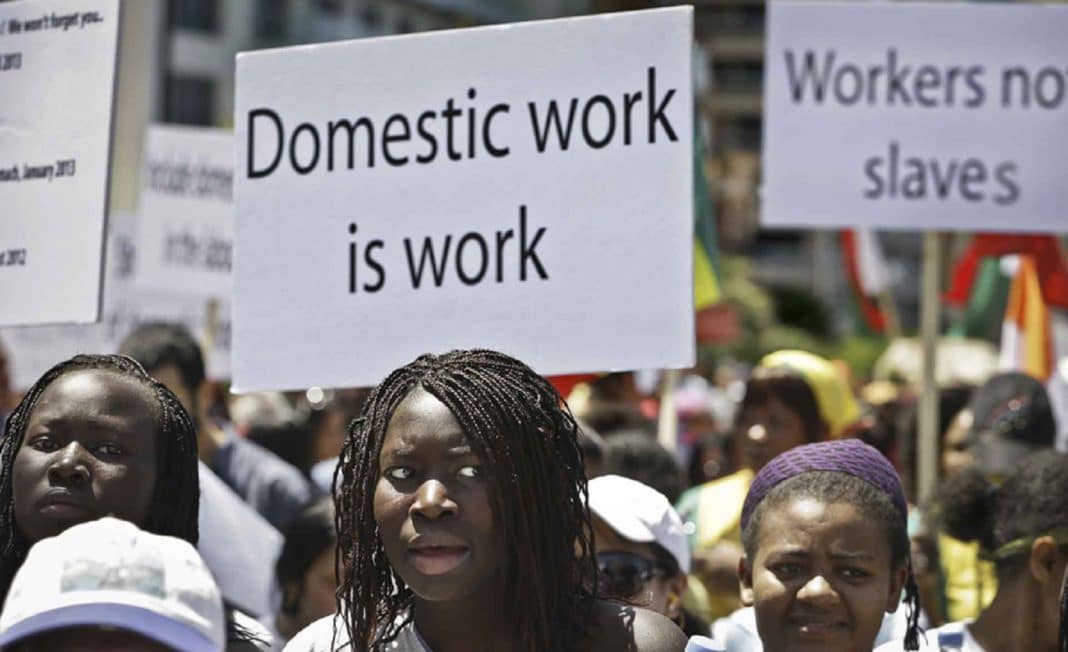
Migrant domestic workers march at Beirut’s seaside and hold banners demanding basic labor rights as Lebanese workers during a 2013 protest. The recent beating of two Kenyan domestic workers in Lebanon highlights the ongoing problem of violence against Black women in Arab countries. (Photo: Hussein Malla/AP)
There is a problem in the Arab world with the abuse of Black women. Arab racism against people of African descent goes back to the days of slavery and continues to the present, with African women facing dual oppression as women and as Black people. Cruel acts of Arab racism against Black women have gone unnoticed, as Face2face Africa reported, with the brutal beating of two Kenyan women by a Lebanese soldier — after he nearly hit them with a car and they confronted him about it — as one of the more recent and poignant examples of a larger problem.
The video of the assault, which has gone viral, shows two women, who are known as Rosa and Shamila, pulled by the hair and beaten by a crowd of people on a busy street in Beirut. The two women and three of their assailants, including an off-duty Lebanese soldier, were arrested after the incident on June 17. Shamila, a domestic worker, was issued a deportation order, the decision of which was then placed on hold as a result of public outrage, pending the outcome of the assault case.
This is the moment two Kenyan women were beaten by a ‘Lebanese official’ in Beirut pic.twitter.com/LhpoweLt6k
— Middle East Eye (@MiddleEastEye) June 25, 2018
The Kenyan government has called for the prosecution of the five people seen in the video assaulting the women. “We are insisting on the prosecution of the culprits so that they meet the full force of the law. We are also demanding an apology from the Lebanese authorities,” read a statement from the Ministry of Foreign Affairs.
“Some media outlets broadcasted news that a soldier in civil clothes assaulted 2 Kenyan women. The Army Command clarifies that the incident which fell on 17/06/2018 was a result of the clearly intoxicated women attacking a soldier and his wife by hitting him with a bottle on the head, leading a civilian to step in and hit the mentioned women,” the Lebanese Army said in a statement, casting blame for the incident on the two beaten African women instead of the Lebanese citizens.
In 2008, Human Rights Watch reported that domestic workers were dying in Lebanon at a rate of more than one per week, mostly from suicide and botched escapes. Women undertake these desperate measures because they are attempting — even from windows and balconies in high-rise buildings — to escape forced confinement and mistreatment in isolation, behind closed doors and in private homes.
Officials from the African migrants’ embassies in Lebanon have sobering words, including one former ambassador: “Don’t call this an embassy. We have become a funeral parlor. People die. Natural deaths, accidents, suicide. When they try to run away, accidents happen.” Sometimes, these women are locked for days by their employers. Throughout the Arab world, African women who serve as domestic workers are subjected to harsh treatment, including beatings, broken arms, 21-hour workdays, inadequate living conditions and medical care, food deprivation, burnings, and more.
This latest incident in Lebanon comes following the 2016 burning death of a Kenyan woman named Mary Kibawana Kamajo, a housemaid who lingered for three months after she was set alight in the home by her Lebanese boss using a gas cylinder. Kamajo described the conditions she faced at the hands of her employers. “My female boss and her daughter would often beat me for the most trivial of reasons. They would also give me bad food,” she said. “I had no breaks from work and I would toil from 6 am daily to late in the night. They took my passport away the day I arrived, and I had no access to a calendar so I never knew what day it was, let alone the time.”
One Kenyan domestic worker in Lebanon had bleach poured over her head as punishment for cleaning too slowly, as her employer threatened to send her home in a box, while another Kenyan woman in Saudi Arabia was offered a choice of having sex with her boss or death. Last year, a Lebanese national was arrested for the alleged rape of his 19-year old domestic worker in Accra. When the suspect’s wife, children and another domestic worker were away, he reportedly beat her savagely after she rejected his demands for sex, slapped her and dragged her to his bedroom to rape her. The victim said this was the fourth time the man had raped her in two separate occasions.
In 2017, an Ethiopian housekeeper in Kuwait fell from the seventh-floor balcony of an apartment building because her employer was trying to kill her. “The lady put me in the bathroom and was about to kill me in the bathroom without anybody finding out,” the woman said. “She would have thrown my body out like rubbish, so instead of staying there I went to save myself and then I fell.”
It is a thorny issue for African and Mideast nations. Throughout the Persian Gulf, 2.4 million domestic workers live in slavery, according to the International Trade Union Confederation. Arab countries typically recruited domestic workers from Asian nations such as Philippines, Indonesia and India. However, those Asian nations have begun to establish regulations to protect their people once stories of abuse surfaced, causing Arab countries to recruit in Africa. African women, including hundreds of thousands from Kenya, facing poverty and unemployment at home and attracted to the promise of lucrative work and the chance to send remittances to their families, have moved to Arab nations.
A sponsorship system known as kafala ties workers’ legal status directly to their employer. Once they arrive in their host country their employers confiscate their passports and other important documents and are protected by the law. Typically, these women have no protection from these states’ labor laws. As a result of the violence, nations such as Kenya, Uganda and Ethiopia banned their citizens from domestic work in the Mideast. Workers continued to come, and Saudi Arabia deported thousands of workers who were there illegally. However, African countries have lifted or partially lifted these bans, and the abuse of Black women continues.
Some African domestic workers have faced human trafficking. In Saudi Arabia African women have been raped, as well as imprisoned with fears of being stoned to death. Saudi Arabia has come under fire for imposing death sentences for female foreign domestic workers, including a number of beheadings. In Kuwait, women from Sierra Leone, Cameroon, Kenya, and Ethiopia are sold like slaves to families by recruitment agencies and find it difficult to leave.
Tanzanian domestic workers in Oman and the UAE are subjected to excessive hours, unpaid salaries and physical and sexual abuse, according to Human Rights Watch. Some workers are forced to relinquish their salaries as a condition for their “release.”
The Mideast has developed a reputation as the worst place for domestic workers. Yet African women have shown a willingness to take the risk and work in Arab nations because of the competition for jobs and less rewarding work in their home countries. Further, some are single mothers and will make the calculation of facing possible mistreatment for the promise of a higher paying job abroad, as opposed to a job at home in which they are unable to support their family. Similarly, domestic workers in Arab nations who escape from their abusive employers risk arrest and imprisonment for walking the streets alone. Sending and receiving countries must make efforts to stop the exploitation of workers, as the Global Observatory notes, with the abolition of the kafala system, and a sweeping new policy that is widely disseminated so that all workers and potential workers are made aware. In addition, domestic workers should be provided with Arabic- or English-language training prior to departure. An orientation program for employees and employers on their rights and obligations under the employment contract would be constructive. Further, given that these African women often are made to sign contracts written in a language they do not understand, documents should be written in their native language.
Arab countries have a legacy of an African slave trade that targeted women who were kidnapped and captured in war, becoming sex slaves and bearing children whose genes are still evident across the Arab world. The ongoing violence against African women is a sign that anti-Black racism and slavery are alive and well in Arab nations.


